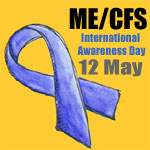 ME/CFS is a chronic disease that involves debilitating pain, cognitive impairment, crushing exhaustion, and a host of other nasty symptoms. Sufferers also experience post-exertional morbidity, which means they feel worse following even light exertion and require an extended recovery period. Many people with ME/CFS are housebound or bedbound.
ME/CFS is a chronic disease that involves debilitating pain, cognitive impairment, crushing exhaustion, and a host of other nasty symptoms. Sufferers also experience post-exertional morbidity, which means they feel worse following even light exertion and require an extended recovery period. Many people with ME/CFS are housebound or bedbound.Despite the severity of the disease, far too many people dismiss "chronic fatigue syndrome" as hypochondria or malingering. It's neither.
There is no cure. There isn't much in the way of treatment.
But there has been some progress of late.
Good research
The Open Medicine Foundation is conducting desperately needed research on the disease. In a study published in fall 2016, they found evidence that patients have a metabolic signature similar to animals in hibernation. You can donate to the OMF here.
Pushback on bad research
A deeply flawed study from a few years ago claimed that ME/CFS patients could be helped by exercising. They can't. Exercise is harmful to ME/CFS patients. The study gained traction despite complaints from sufferers who called out the study's obvious methodological problems. But within the past year, David Tuller published a series called Trial by Error that went into great (great great) detail about said methodological problems. The scientific community finally started paying attention. While the flawed paper hasn't been retracted yet, subsequent activity has forced the researchers to release the data so that others can examine it.
If you don't have time to read all of Trial by Error, this New York Times piece by David Tuller and Julie Rehmeyer will fill you in.
For more details on ME/CFS 101, try this handy FAQ.
And seriously, please donate to the Open Medicine Foundation.